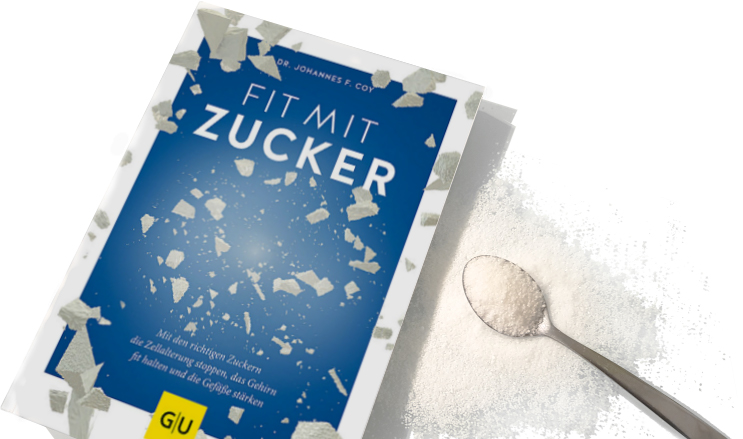Learn more about Dr. Coy and the creation of his sugar solutions.
Dr Johannes Coy is a world-renowned scientist whose research focuses on the health benefits of sugar awareness. Dr Coy has made a number of important genetic discoveries which change our understanding of cancer and nutrition and make him the leading expert on sugars.

Book: Fit with Sugar, by Dr Johannes Coy
Dr Coy has written several books about cancer nutrition. His latest book, Fit with Sugar, is now available. In this book, you’ll discover the evolutionary role of sugar in the human body. Consuming too much conventional sugar isn’t good for our health, but with the right sugars, we can stop cell ageing, keep the brain fit, protect against diseases and switch on fat burning. Find out how you can maintain physical and mental performance using natural low- glycaemic sugars and sugar substitutes. The book includes many delicious recipes for cakes, snacks and desserts, so you can implement a sugar-conscious diet easily and intelligently, without giving up sweet treats.
Buy the book: Cancer-Fighting Diet: Diet and Nutrition Strategies to Help Weaken Cancer Cells and Improve Treatment, by Dr Johannes Coy.
Research & Resources
Integration of parenteral nutrition with galactose may improve neurodevelopmental outcomes for preterm newborns
This study proposes that integrating galactose into parenteral nutrition for premature infants could more closely replicate the natural nutrient environment of the womb. By doing so, it may better support metabolic development, energy regulation, and growth in early life. The authors argue that this approach challenges conventional neonatal nutrition, which often overlooks the role of galactose in fetal metabolism. While the paper is largely theoretical, it highlights the potential benefits of galactose-enriched nutrition for improving outcomes in preterm infants and encourages further clinical investigation.
Combined effects of replacement of sucrose with d-tagatose and addition of different probiotic strains on quality characteristics of chocolate milk
Nowadays, tendency to improve human nutrition and consume new healthful foods such as low-calorie and functional ones has been increased. In this study, effects of ratios of sucrose/d-tagatose (100:0, 0:100, or 50:50) as well as type of commercial probiotic strains (Lactobacillus acidophilus LAFTI L10, Lactobacillus casei LAFTI L26, Lactobacillus rhamnosus HN001, and Bifidobacterium animalis subsp. lactis LAFTI B94) on biochemical and microbiological characteristics, percent of residual sugar, color, and sensory attributes of synbiotic chocolate milk were investigated during 21 days of refrigerated storage (5 °C). The treatments inoculated with L. acidophilus, L. casei, L. rhamnosus, and B. lactis showed significantly higher biochemical and color changes compared to non-probiotic ones. The greatest viability at the end of storage was related to the treatment of d-tagatose with L. rhamnosus (T-R) as well as d-tagatose with L. casei (T-C). Although L. acidophilus, L. casei, and L. rhamnosus mostly tended to ferment d-tagatose, B. lactis did not substantially consume the mentioned sugar. In general, the treatments T-R, ST-R (sucrose and d-tagatose with L. rhamnosus), T-B (d-tagatose with B. lactis), and ST-B (sucrose and d-tagatose with B. lactis) were realized as the best ones in terms of probiotic viability, functional property of d-tagatose, and sensory attributes. In conclusion, d-tagatose could be successfully used as a natural sugar substitute with functional properties for probiotic chocolate milks enhancing their health benefits, but the proper selection of ratio of sucrose/d-tagatose and type of probiotic strain is recommended.
Added sugar and dental caries in children: a scientific update and future steps
This scientific article discusses the strong association between added sugar intake and tooth decay in children in the United States. It emphasizes that sugar-sweetened beverages are the main source of added sugars in children’s diets. While health education is important, it alone is not enough to improve children’s beverage choices. The article highlights the influence of social factors such as socioeconomic disadvantage, household habits, and the availability of sugary products in local stores on added sugar intake. Sociobehavioral interventions, although currently uncommon, show promise in reducing added sugar intake and preventing tooth decay in children. Additionally, upstream approaches like sugar-sweetened beverage bans in schools, warning labels, and taxes can further help reduce excessive added sugar consumption. Although there is a lack of evidence-based clinical strategies, dental health professionals can adopt systematic clinical practices to identify and address excess added sugar intake in pediatric patients. The article calls for more research on sociobehavioral interventions, targeted public health programs for high-risk children, and changes in health policies to address this issue.
Cross-lagged associations between children’s stress and adiposity: the Children’s Body Composition and Stress study
This longitudinal study found that adiposity (body fat) in children is associated with increased stress levels over time. However, stress does not directly cause increases in adiposity. The relationship between stress and adiposity is influenced by cortisol levels and lifestyle factors. These findings highlight the importance of considering multiple factors in obesity prevention programs and the negative impact of unhealthy body composition on children’s well-being.
Consumption of Soft Drinks and Overweight and Obesity Among Adolescents in 107 Countries and Regions
This scientific article examines the relationship between soft drink consumption and the prevalence of overweight and obesity in adolescents. The study analysed data from 107 countries and regions, including a total of 405,528 school-going adolescents. The findings revealed that there was a positive correlation between the prevalence of daily soft drink consumption and the prevalence of overweight and obesity among adolescents. The analysis indicated a statistically significant association between daily soft drink consumption and overweight and obesity in school-going adolescents. The study suggests that reducing soft drink consumption should be a priority in addressing the issue of adolescent overweight and obesity.
Get in touch with Intelligent Sugar
Got a question about Dr Coy’s sugars? Contact info@intelligentsugar.info
If you have a question about a specific health condition, please speak to your doctor.

